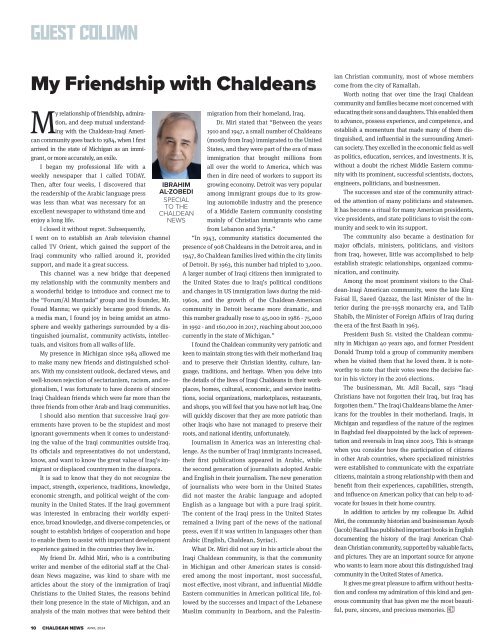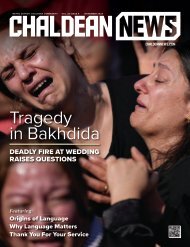Create successful ePaper yourself
Turn your PDF publications into a flip-book with our unique Google optimized e-Paper software.
GUEST COLUMN<br />
My Friendship with Chaldeans<br />
My relationship of friendship, admiration,<br />
and deep mutual understanding<br />
with the Chaldean-Iraqi American<br />
community goes back to 1984, when I first<br />
arrived in the state of Michigan as an immigrant,<br />
or more accurately, an exile.<br />
I began my professional life with a<br />
weekly newspaper that I called TODAY.<br />
Then, after four weeks, I discovered that<br />
the readership of the Arabic language press<br />
was less than what was necessary for an<br />
excellent newspaper to withstand time and<br />
enjoy a long life.<br />
I closed it without regret. Subsequently,<br />
I went on to establish an Arab television channel<br />
called TV Orient, which gained the support of the<br />
Iraqi community who rallied around it, provided<br />
support, and made it a great success.<br />
This channel was a new bridge that deepened<br />
my relationship with the community members and<br />
a wonderful bridge to introduce and connect me to<br />
the “Forum/Al Muntada” group and its founder, Mr.<br />
Fouad Manna; we quickly became good friends. As<br />
a media man, I found joy in being amidst an atmosphere<br />
and weekly gatherings surrounded by a distinguished<br />
journalist, community activists, intellectuals,<br />
and visitors from all walks of life.<br />
My presence in Michigan since 1984 allowed me<br />
to make many new friends and distinguished scholars.<br />
With my consistent outlook, declared views, and<br />
well-known rejection of sectarianism, racism, and regionalism,<br />
I was fortunate to have dozens of sincere<br />
Iraqi Chaldean friends which were far more than the<br />
three friends from other Arab and Iraqi communities.<br />
I should also mention that successive Iraqi governments<br />
have proven to be the stupidest and most<br />
ignorant governments when it comes to understanding<br />
the value of the Iraqi communities outside Iraq.<br />
Its officials and representatives do not understand,<br />
know, and want to know the great value of Iraq’s immigrant<br />
or displaced countrymen in the diaspora.<br />
It is sad to know that they do not recognize the<br />
impact, strength, experience, traditions, knowledge,<br />
economic strength, and political weight of the community<br />
in the United States. If the Iraqi government<br />
was interested in embracing their worldly experience,<br />
broad knowledge, and diverse competencies, or<br />
sought to establish bridges of cooperation and hope<br />
to enable them to assist with important development<br />
experience gained in the countries they live in.<br />
My friend Dr. Adhid Miri, who is a contributing<br />
writer and member of the editorial staff at the Chaldean<br />
News magazine, was kind to share with me<br />
articles about the story of the immigration of Iraqi<br />
Christians to the United States, the reasons behind<br />
their long presence in the state of Michigan, and an<br />
analysis of the main motives that were behind their<br />
IBRAHIM<br />
AL-ZOBEDI<br />
SPECIAL<br />
TO THE<br />
CHALDEAN<br />
NEWS<br />
migration from their homeland, Iraq.<br />
Dr. Miri stated that “Between the years<br />
1910 and 1947, a small number of Chaldeans<br />
(mostly from Iraq) immigrated to the United<br />
States, and they were part of the era of mass<br />
immigration that brought millions from<br />
all over the world to America, which was<br />
then in dire need of workers to support its<br />
growing economy. Detroit was very popular<br />
among immigrant groups due to its growing<br />
automobile industry and the presence<br />
of a Middle Eastern community consisting<br />
mainly of Christian immigrants who came<br />
from Lebanon and Syria.”<br />
“In 1943, community statistics documented the<br />
presence of 908 Chaldeans in the Detroit area, and in<br />
1947, 80 Chaldean families lived within the city limits<br />
of Detroit. By 1963, this number had tripled to 3,000.<br />
A larger number of Iraqi citizens then immigrated to<br />
the United States due to Iraq’s political conditions<br />
and changes in US immigration laws during the mid-<br />
1960s, and the growth of the Chaldean-American<br />
community in Detroit became more dramatic, and<br />
this number gradually rose to 45,000 in 1986 - 75,000<br />
in 1992 - and 160,000 in 2017, reaching about 200,000<br />
currently in the state of Michigan.”<br />
I found the Chaldean community very patriotic and<br />
keen to maintain strong ties with their motherland Iraq<br />
and to preserve their Christian identity, culture, language,<br />
traditions, and heritage. When you delve into<br />
the details of the lives of Iraqi Chaldeans in their workplaces,<br />
homes, cultural, economic, and service institutions,<br />
social organizations, marketplaces, restaurants,<br />
and shops, you will feel that you have not left Iraq. One<br />
will quickly discover that they are more patriotic than<br />
other Iraqis who have not managed to preserve their<br />
roots, and national identity, unfortunately.<br />
Journalism in America was an interesting challenge.<br />
As the number of Iraqi immigrants increased,<br />
their first publications appeared in Arabic, while<br />
the second generation of journalists adopted Arabic<br />
and English in their journalism. The new generation<br />
of journalists who were born in the United States<br />
did not master the Arabic language and adopted<br />
English as a language but with a pure Iraqi spirit.<br />
The content of the Iraqi press in the United States<br />
remained a living part of the news of the national<br />
press, even if it was written in languages other than<br />
Arabic (English, Chaldean, Syriac).<br />
What Dr. Miri did not say in his article about the<br />
Iraqi Chaldean community, is that the community<br />
in Michigan and other American states is considered<br />
among the most important, most successful,<br />
most effective, most vibrant, and influential Middle<br />
Eastern communities in American political life, followed<br />
by the successes and impact of the Lebanese<br />
Muslim community in Dearborn, and the Palestinian<br />
Christian community, most of whose members<br />
come from the city of Ramallah.<br />
Worth noting that over time the Iraqi Chaldean<br />
community and families became most concerned with<br />
educating their sons and daughters. This enabled them<br />
to advance, possess experience, and competence, and<br />
establish a momentum that made many of them distinguished,<br />
and influential in the surrounding American<br />
society. They excelled in the economic field as well<br />
as politics, education, services, and investments. It is,<br />
without a doubt the richest Middle Eastern community<br />
with its prominent, successful scientists, doctors,<br />
engineers, politicians, and businessmen.<br />
The successes and size of the community attracted<br />
the attention of many politicians and statesmen.<br />
It has become a ritual for many American presidents,<br />
vice presidents, and state politicians to visit the community<br />
and seek to win its support.<br />
The community also became a destination for<br />
major officials, ministers, politicians, and visitors<br />
from Iraq, however, little was accomplished to help<br />
establish strategic relationships, organized communication,<br />
and continuity.<br />
Among the most prominent visitors to the Chaldean-Iraqi<br />
American community, were the late King<br />
Faisal II, Saeed Qazzaz, the last Minister of the Interior<br />
during the pre-1958 monarchy era, and Talib<br />
Shabib, the Minister of Foreign Affairs of Iraq during<br />
the era of the first Baath in 1963.<br />
President Bush Sr. visited the Chaldean community<br />
in Michigan 40 years ago, and former President<br />
Donald Trump told a group of community members<br />
when he visited them that he loved them. It is noteworthy<br />
to note that their votes were the decisive factor<br />
in his victory in the 2016 elections.<br />
The businessman, Mr. Adil Bacall, says “Iraqi<br />
Christians have not forgotten their Iraq, but Iraq has<br />
forgotten them.” The Iraqi Chaldeans blame the Americans<br />
for the troubles in their motherland. Iraqis, in<br />
Michigan and regardless of the nature of the regimes<br />
in Baghdad feel disappointed by the lack of representation<br />
and reversals in Iraq since 2003. This is strange<br />
when you consider how the participation of citizens<br />
in other Arab countries, where specialized ministries<br />
were established to communicate with the expatriate<br />
citizens, maintain a strong relationship with them and<br />
benefit from their experiences, capabilities, strength,<br />
and influence on American policy that can help to advocate<br />
for Issues in their home country.<br />
In addition to articles by my colleague Dr. Adhid<br />
Miri, the community historian and businessman Ayoub<br />
(Jacob) Bacall has published important books in English<br />
documenting the history of the Iraqi American Chaldean<br />
Christian community, supported by valuable facts,<br />
and pictures. They are an important source for anyone<br />
who wants to learn more about this distinguished Iraqi<br />
community in the United States of America.<br />
It gives me great pleasure to affirm without hesitation<br />
and confess my admiration of this kind and generous<br />
community that has given me the most beautiful,<br />
pure, sincere, and precious memories.<br />
10 CHALDEAN NEWS <strong>APRIL</strong> <strong>2024</strong>
















